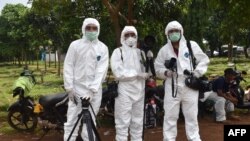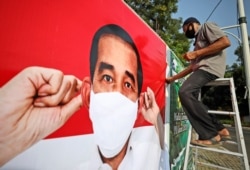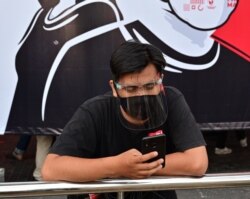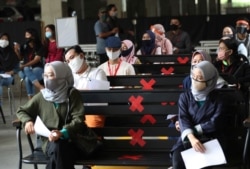Abdi, a journalist at the privately owned radio station Suara Surabaya, never thought he would catch the coronavirus. But when dozens of other workers started coughing and feeling feverish in early September, he and his colleagues took a rapid test.
The results showed 18 people had COVID-19, including Abdi and 11 others in his division, the journalist told VOA on September 26.
Abdi, who asked VOA not to use his real name to avoid potential repercussions, said he was shocked to discover he'd tested positive, despite following safety measures.
Suara Surabaya had imposed a strict health protocol to prevent the coronavirus from spreading, such as wearing face masks, social distancing, washing hands and allowing some employees to work from home, the journalist said.
Abdi said he went out only to report on important events that could not be covered virtually.
"We have made such a protocol mandatory — use of hand sanitizer, face masks, social distancing were in place — but we still have cases," Abdi said.
The journalist, who is recovering from the virus, said he worries about reporting during the pandemic.
Suara Surabaya is among a handful media companies in Indonesia that have opened up to the public about workers who tested positive.
In a September 7 article, "Finally, Our Fortress Breaks Down," the outlet's editorial team reported on the cases among its own journalists.
The news outlet worked with the Surabaya Municipal Administration to move the 18 workers to a hotel in the city that is being used as a COVID treatment center.
"Human resources are invaluable and irreplaceable company assets. They are getting the best service," Errol Jonathan, the chief executive of Suara Surabaya Media, said in a statement.
Lax safety
The experience of Abdi and his Suara Surabaya colleagues is not an isolated case.
The Indonesian Alliance of Independent Journalists (AJI) said on September 22 that at least 242 journalists and media workers had tested positive for the coronavirus between March 30 and September 18. The organization's data came from journalists self-reporting cases, and information tracked by 38 AJI affiliates.
As of Thursday, Indonesia as a whole had 291,182 confirmed cases and over 10,800 deaths, according to data from the Johns Hopkins University Coronavirus Resource Center.
Musdalifah Fachri, from the AJI's advocacy division, said the government has failed to uphold health protocol at some press events. At least seven face-to-face news conferences that took place in July and August did not follow the government's safety precautions such as physical distancing, the AJI said.
Events cited by the AJI included a press conference held by the Gorontalo Provincial COVID-19 Task Force in July and a briefing by Ilyas Panji Alam, head of the Ogan Ilir Regency administrative region in South Sumatra, during which he announced he had the virus.
In addition, a number of ministries and institutions held face-to-face press conferences without following the government's health protocols.
"We recommend that all government officials and state institutions hold online press conferences and send data or information through email or online applications," said Fachri.
Fachri also encouraged news outlets to pay attention to the safety of their journalists, by taking measures such as not sending them to in-person briefings and providing personal protection equipment for those on assignment in areas with high rates of COVID-19.
Wiku Adisasmito, the spokesperson for the National COVID-19 Task Force, said the government would examine the AJI findings. He added that journalists should consider avoiding in-person press conferences.
Cases rise among businesses
Adisasmito's calls for private companies to protect employees came as businesses in Jakarta reported new cases.
As of September 12, at least 3,194 office workers in the city had tested positive since the start of the pandemic, according to data from National COVID-19 Task Force. The figure includes 88 people from the media conglomerate MNC Group, according to figures from the Jakarta Provincial Manpower Office.
"Rampant clusters in offices, plants and several state officials who tested positive for COVID-19 show implementation of health protocols remains loose. It's time to evaluate all places so this won't happen," said Adisasmito during a September 22 press conference at the Presidential Palace.
A strict health protocol is in place for government offices, including temporarily closing ministry offices and provincial government offices when positive cases are identified, the spokesperson said.
"Don't be ashamed if there are [employees] who tested positive, because they need to be protected, treated until they recover and regain their health," said Adisasmito.
He added that the government would cover the cost of treatment for employees of private companies.
Fitri Wulandari contributed to this report, which originated on VOA Indonesia.












